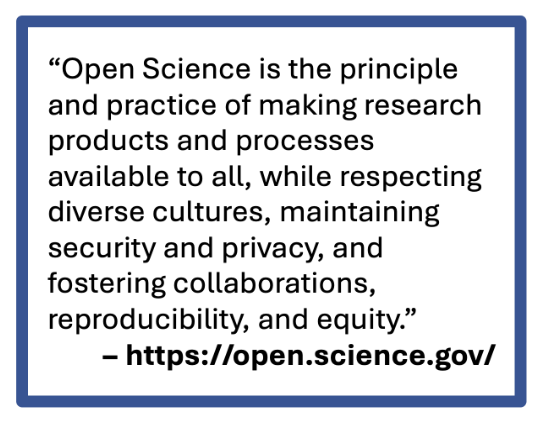Aug
17

Posted by randerson on August 17th, 2023
Posted in: Blog, Newsletter, Thought Leadership
 The White House Office of Science and Technology Policy (OSTP) designated 2023 as the “Year of Open Science” for the federal government. Open Science falls neatly within the mission and scope of work of the National Library of Medicine and the outreach-oriented Network of the National Library of Medicine. In fact, a recent blogpost from Dr. Lisa Federer stressed the Library’s lifetime commitment to Open Science (OS). For us at NEC, OS aligns harmoniously with values that have guided our work since our launch.
The White House Office of Science and Technology Policy (OSTP) designated 2023 as the “Year of Open Science” for the federal government. Open Science falls neatly within the mission and scope of work of the National Library of Medicine and the outreach-oriented Network of the National Library of Medicine. In fact, a recent blogpost from Dr. Lisa Federer stressed the Library’s lifetime commitment to Open Science (OS). For us at NEC, OS aligns harmoniously with values that have guided our work since our launch.
We are excited to approach our Grant Year 3 evaluation plans through the lens of Open Science. We believe that OS is intertwined with evaluation in multiple ways, as it influences how research is assessed, measured, and valued. The UNESCO Recommendation on Open Science provides a set of Guiding Principles to help realize the promise of Open Science, which are also highly applicable to evaluation practices:
Read more about the UNESCO Recommendation on Open Science (Français, Español, Português, العربية, 汉语, Русский язык, монгол хэл, lit).
We’re excited to share some of the work that is underway and planned for this year!
Earlier this summer, NEC’s Principal Investigator, Dr. Kristi Holmes participated at the CERN/NASA Open Science Summit in Geneva. This week-long meeting brought together a diverse range of attendees to exchange experiences, ideas and expertise towards advancing the global adoption of open science policies and practices.
In the coming months, we will release our Code of Conduct which spells out how we use our NEC values to guide daily interactions, communications, and collaborations internally amongst the NEC team, and externally, with our NNLM colleagues and others. This is a very deliberate effort on our part to monitor and especially self-monitor Responsibility, Respect, and Accountability, one component of the guiding principles in open science. NEC is clearly not alone in thinking broadly about the role of evaluation in OS, and we are finding inspiration from our fellow evaluators (for example, see this fantastic blog by Rafols, Meijer and Molas-Gallart, “The benefits of Open science are not inevitable: monitoring its development should be value-led”). Work is underway within NEC and in collaboration with other Evaluators to promote more open and respectful evaluation practices, enhance knowledge gained and assess meaningful impact. We are excited about the many opportunities to learn and grow on a global scale and drive the Open Science agenda for the benefit of all.